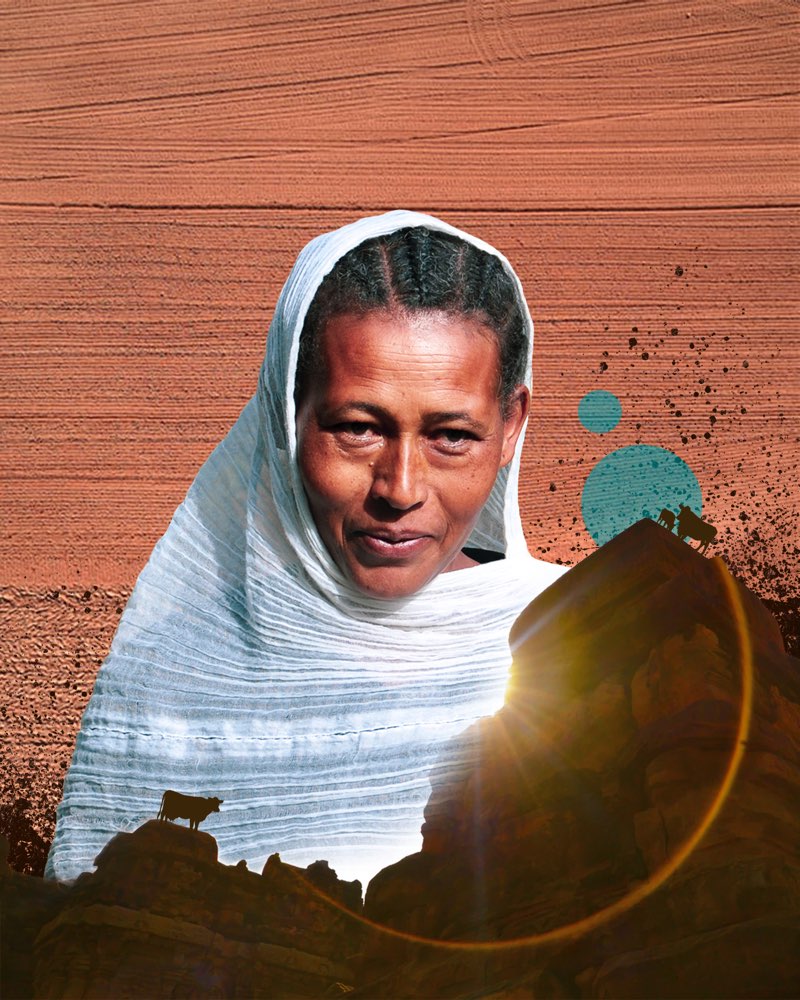
Worke Shumye
Age at interview: 45
Holeta, Ethiopia
A calm voice comes over the phone, rhythmic and poetic, like gentle rain. It is the voice of Worke, a mother, wife, and farmer in the Oromia[1] region of Ethiopia. Her mother is Oromo, and her father is Amhara. Despite the social expectation to identify as Amhara, Worke claims both Amhara and Oromo identities. She has limited land, yet she makes do with the small plot of land around her homestead. She produces a diversity of crops through intercropping and organic vegetable production. Worke’s relentless effort has led to self-sufficiency and food security for her and her family. She still manages to devote the majority of her time to her land while raising her four children. Even as we spoke, she worked. “Please don't worry,” she chuckled after I apologized during one of our interviews for interrupting her daily routine by calling her for such a lengthy conversation. “I'm working as I'm talking to you. I'm weeding in my garden, so don’t worry about it,” she emphasised. “I am not idle.”
I was born in Bale Province in south-eastern Ethiopia in 1972. I grew up in the transition between the Derg regime and the Ethiopian People's Revolutionary Democratic Front, the government that ousted the military junta.[2] I remember quite vividly a sense of peace descending on our community following the ousting of the Derg regime.
We had grown accustomed to living in fear that the young men in our community would be drafted into the military. We despised the Derg regime. This fear shifted after the Derg regime was removed from power. It became relatively peaceful, and the fate of the young men changed. They could actually go to school.
I was raised by my grandparents. They are the people I see as my parents. They raised and nurtured me as parents, so that is who they are to me. My mother gave birth to me at an early age. I am not sure how old she was exactly. My grandmother told me that they believed my mother could not even produce breast milk to nurse me because she was so young. So my paternal grandparents took me and raised me on their farm because my mother was still too young to manage. My grandparents had me from the day I was born, and in order to feed me, they gave me milk from the cow.
My father and my mother got together in an arranged marriage. A few years after my birth, my parents had other children. I have four brothers and one sister. I am the eldest, and the second-born, Alamayo, is 44. After him comes another boy, Zerai, he is 40. My only sister, Seble, is the fourth child, and the fifth is Deraji. He is about 34 years old. The youngest of all of my siblings is Natnael; he is 25 years old. When they were young, I used to help take care of Seble, Deraji, and Natnael. While my siblings have my father’s name, Tasfu, I have my grandfather’s name, Shumye.
Even though I was being raised by my father’s parents, my father hardly ever came to visit us on the farm. My father was a driver working for the Agriculture and Rural Development Ministry in the agriculture research department. He lived in the camp where his department was based. My birth parents, along with my siblings, lived between Addis Ababa and Bale, as they had homes in both places. My first ever trip to Addis was to visit my parents just before I turned 10. Since they did not permanently live in Addis, I would also see them when they were in Bale.
While in Bale, my siblings would come and visit, spending the whole day with me in my grandparents’ house. But at night they always went home to my mother and father, and I stayed back with my grandparents. I preferred to be with my grandparents. Between my occasional trips to Addis and the time my parents spent in Bale, I managed to see them quite often.
No greater satisfaction
I come from a long line of farmers and pastoralists, which is why the farming blood has always been running through my body. My grandfather and grandmother own commercial farmland in a place called Agarfa.[3] They cultivate wheat, barley, and finger millet, the most common cereals in Bale, the Zone where Agarfa is in. Commercial cereal production is how they have built a very comfortable life for themselves and for me. My grandparents farmed their whole lives, and yet I somehow did not so much as touch a hoe till much later in my life.
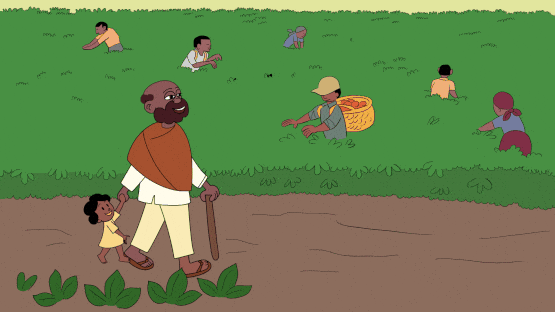
I spent my early years mostly around my grandfather. I was the only child in my grandparents’ house. My grandfather knew a lot about farming, though he didn’t physically do the labour on the farm. He had many people who worked for him; there were 10 farmers and four domestic workers in total. My grandfather would go around his farm checking what the workers were doing, how they were planting or harvesting, and just ensuring that all was in order. So, as a child, I went around with him, watching as the workers worked and listening to my grandfather and the workers discussing the work ahead. I learnt many things about farming without even knowing it. Other than my adventures around the farm, where there was always something new to discover, all I had to do was eat and drink. I loved drinking yogurt and eating honey, those were my favourite foods. I had a very happy childhood.
Even though I was pampered and had a comfortable childhood, my grandparents were very serious about hard work. They gave me good food, they gave me a good life, and they always made sure that I was serious about doing my best and working hard. My grandfather taught me a disciplined work ethic without ever asking me to do any work. I watched how hard he worked, and he often talked about how there is no greater satisfaction than being fed from one’s own labour.
Married life was going to be very different
When I was 19, I went to visit my father in Addis Ababa, and being intrigued by the city life, I decided to stay there with him. The relatives of the man that is now my husband lived close to where my father lived. They used to see me in the neighbourhood, and eventually, they approached my father to arrange our marriage.
After getting married at 20, I moved out from home to live with my husband. At first, I was not farming because my husband and I lived in a town. I remember the first weeks after I got married. I was like a teenager, leaving my marital home every chance I got. I would go back to my parents for no reason, more so when there was the slightest bad treatment from my husband. I would leave if I thought he had so much as looked at me the wrong way. It was typical of me.
Eventually, though, after my father retired, my parents and siblings moved permanently to Addis to ensure my siblings had a better education in the city. By that time, though, I was already living in Holeta, which is about 40 kilometres from Addis Ababa.
Married life was a big change and quite a challenge for me — not just with regards to learning to relate with my husband, but also adapting to the change in lifestyle. Growing up in Bale, what I remember most is the abundance of milk, honey, and butter, which was not the same in Holeta.
I recall when I first moved to Holeta, I drank coffee at my new house, and it was very bitter. It was unbearably bitter because I had never tasted coffee without milk. I still remember that bitter taste in my mouth and the sudden realisation that my new married life was going to be very different from life back home with my grandparents.
My grandfather had to come several times to comfort me and to try to help me adapt to the new life I had started with my husband, living on my in-laws’ land. It wasn't until I gave birth to my first child that I became more reflective about my marriage and more committed to making it work. Before that I was self-obsessed and acted only out of self-interest.
Now I have two daughters and two sons between the ages of three and 19. The two boys and one of the girls go to school. The youngest girl is only three years old, so she still stays home with me. I still keep in touch with my siblings, and from time to time, they come over to Holeta to check on me and my family and to see my children. In most cases they come with my mother.
Love instead of anger
My husband takes good care of me and counters my stubbornness with love instead of anger. Even when we were newlyweds, he understood my emotional behaviour. He was not a typical husband. He was very understanding, and he still is. People who knew me as a teenager — as an impatient and naïve girl who struggled to commit to anything, including my marriage — still wonder how I could be the successful person I am in agriculture today. They wonder how I have managed to stay engaged in this difficult line of work that can be so unpredictable.
I know for sure that the love of my family has grounded me. If I'm having a bad day, my husband always says, "Just sit down. Relax, I'll make coffee for you." I treasure those cups of coffee from my husband. His love really grounds me.
On one occasion in 2011, my grandfather came to visit me when we had just harvested a large amount of potatoes and sold it at the market. That nightfall, when the family gathered for dinner, I served some of the potatoes to my grandfather, and he said, "Do you see how good it feels to eat your hard work?"
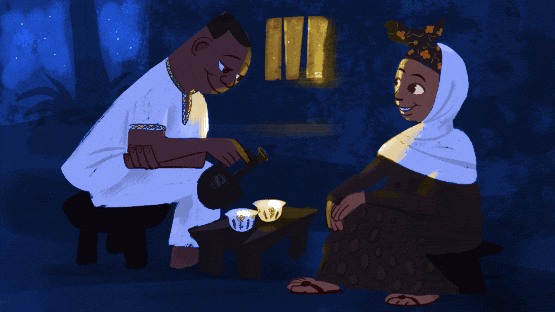
He reiterated to my husband that this is what he always wanted for me: to be self-sufficient. That day he was very happy to have been fed from the fruits of my labour, and he told me that he was content because his one wish in life for my welfare had been fulfilled.
They do not have the same freedom
Fortunately, my husband is very patient. He's the reason that I am the mature person I am today. I don't have many friends because I mostly spend my days in my garden or with my children. I do, however, take an active part in village activities, and sometimes I act as sort of a counsellor for fellow women in the village.
In these processes, I get to see what women think of their husbands and hear about the ways these husbands treat their wives. Most of them are treated badly and complain about their husbands. They do not have the same freedom that I have.
Whatever I do in terms of work, whatever I grow, and whatever I earn from it, I get to decide what I want to do with the money. My husband does not get involved, and this gives me the financial freedom to do what I wish with my earnings.
Secondly, for me, freedom means I do not have the burden of work that most men impose on their wives. In our family, like any other home, there are chores to be done, but those chores are not just my responsibility. My husband and children share the work with me. I find this way of life liberating, and it is sad that many other women in my community do not have these kinds of freedoms.
My hopes are also for my community
When we first got married, my husband wanted me to be a businesswoman. Failing that, he wanted me to further my education and maybe work in some sort of organisation doing office-based work. I did not want to do any of those, and my husband did not insist. Instead I decided to go into farming because I grew up in a farming household. I'm passionate about agriculture, and I’d always wanted to pursue it.
At one point my husband gave me around 30,000 Birr, which was approximately $1,500 USD at that time. It was for me to use to update the family home. Instead, I bought a cart to transport my vegetables, and my husband accepted my decision. My hope is that my farming continues to grow and expand. My hopes, though, are also for my community, not just for myself.
A life of being able to produce my own food and being able to provide for others is what I envisioned for myself from childhood. Unlike other babies that are nursed by their mothers and are introduced to life through their mother’s milk, I was connected to the land immediately by being fed on cow’s milk. Since then, the connection between the land and me has never withered.
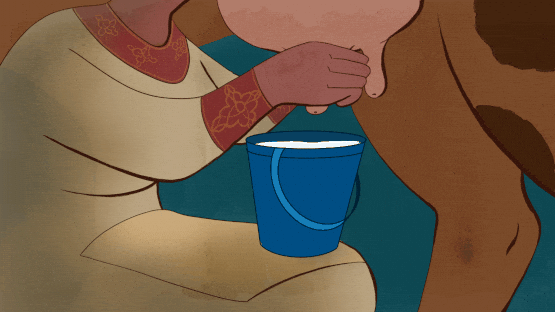
I lost almost everything
I started farming in 2008. When I began farming I was engaged in both cereal and vegetable production. I didn’t have success with cereal production. In fact I lost quite a bit of fortune on that, so I stopped producing cereals. I shifted my focus to growing vegetables.
In 2013, five years into my farming practice, my farm was hit by a pest we call wag. I was growing potatoes on a large scale and doing relatively well until [then]. I lost almost everything. It was the first time that my potato crop had been infested by wag. It took three days of asking around before I learnt that there was a pesticide for this pest and where I could actually find and buy it. I had no idea. And by the time I got the pesticide, most of the crop was damaged, and it was impossible to find someone who was available immediately to spray the crop and salvage whatever crop could still be saved.
My husband was not immediately helpful with finding someone to spray the crop, because … he believed the chemicals were harmful and that they could cause cancer. He even suggested that I leave farming altogether, and he tried to convince me of the harm linked to spraying fertiliser on my potato crop. I was so angry and frustrated by this event.
I felt like a failure
I decided to sell the oxen that I had bought using my profits from three years before to try to salvage something. What I did back then, and what I still do now, is reinvest the profits I earn from the sale of my produce back into the farm. So when I lost all that crop in 2013, I lost all that I had at that time. This is why I was so devastated.
In addition, I also lost all hope, knowing how much work I had put into the farm. Just two years earlier, my grandfather had been proud of what I was achieving with my farming, and here I was now. I felt like a failure.
I came close to relinquishing my land at that time. I was going to give it to other people to cultivate on, and then we would share the profits from their harvest. For an entire year I didn’t farm. Instead I kept bees, harvested honey, and raised chickens. At the end of that year is when I first heard about the Institute for Sustainable Development [ISD][4] from other farmers in my area. They told me about how ISD promotes organic agriculture and the use of compost, as opposed to chemical fertilisers and pesticides. This is what convinced me to start working with ISD.
A new way of production
Through the training from ISD, I learnt a new way of production based on ecological food production, which uses completely chemical-free ways of disease control, as well as land management. I was convinced by ISD’s methods because they were sustainable and they did not require the expensive inputs that my chemical farming required. I received guidance and practical training on how to use these methods on my farm.
Sadly, for a very long time I was fooled into not caring for my land the way I should have. I destroyed its natural content by adding chemical fertilisers and did not allow the land time to rest and rejuvenate.
For years, before I started working with ISD, I had struggled working with chemical fertilisers on my farm because using chemicals meant I needed to have money. Firstly, I needed to buy the chemicals and then I needed to pay someone to apply them for me. I was heavily dependent on chemical fertilisers and pesticides to manage pests and disease on my land before 2013. I didn't know about natural fertiliser use back then, and that led to a devastating loss of both profit and soil fertility.
With the support of ISD I bounced back after the horror of losing my produce to pests. On one occasion a community facilitator for ISD came to visit and saw my garden. She saw my cabbages and suggested that I also plant sweet basil. I was curious, so I didn’t hesitate. And I grew the basil on 300 square metres. It did incredibly well, and I sold what I had grown for 2,000 Birr. I managed to sell the cabbages for 3,000 Birr. I used this money to buy a cow, which costs about 5,000 Birr, about $180 USD. It was such a huge achievement in a very short space of time. This experience makes me believe that agriculture is really in my blood and that I just needed to practice the right type of agriculture.
If I take care of the land, it will take care of me
The land I am farming on was inherited by my husband from his parents. I have completely abandoned any other type of chemically enhanced production and have shifted to producing vegetables such as potatoes, carrots, and garlic. I dig the land myself, by hand. I don't use anything to plough. I do everything on my own. With my husband being absent most of the time due to his work as a health extension officer, I mostly work alone on the land.
My plants are like my children. I have dedicated all my life to them, spending all day with them, day in and day out. Sometimes during the winter, when there is a shortage of rainwater, I get up in the middle of the night to water my plants. When my husband is home, he waters the plants with me. I don't like going away from home for long periods of time.
I love being with my plants because my land is my life and it is a lifeline for my family. I know that if I take care of the land, it will take care of me. The variety of food I have on my land provides me with a range of nutrients because of the different vegetables that I grow, including carrots, celery, and beets. I hardly spend money on food because of the diversity of food that I grow.
They have to take away my hoe
The rhythm of my days revolves around my gardening. In the morning I prepare [the children] for school, send them off, and then send the cattle off to graze.
From that point on I tend to my vegetables, watering and caring for them until my children return at noon. When they return, my son cooks lunch and my daughter makes coffee. Only then do I come back home from my garden.
Sometimes the children have to force me to go into the house to have lunch — because if whatever I have planned for the day is not finished, I cannot rest. Sometimes they have to take away my hoe in order to bring me to the house to eat lunch. In winter, if the weather is sunny, we sometimes have our lunch in the garden as I work.
After lunch I continue working until night falls. Sometimes I get so carried away taking care of my daily chores on the land that I do not mind not taking part in social obligations like mourning, religious, or social events.
To maximise my time in the field, I cook food for the next day before I go to bed. Sometimes I cook until as late as 11 p.m. Cooking can take a lot of time out of your day, but I know that nutrition is such an important part of life and it is the reason I grow the food. So I try to find balance. I only go to sleep after cooking breakfast for the children for the following morning.
A magical experience
Being in my garden is a magical experience. I have bees that I converse with. They tell me what flowers they like and what I should do in my garden. I also talk to my hens and cattle. I even see spiders going after my cabbage. That just amazes me. Nature astonishes me. It helps me to understand that all creatures are created with a purpose. I can feel when the birds are thirsty so I give them water. I am amazed at how they get thirsty just like I do. It's incredible.
As I enter my garden, it smells like something I cannot explain. It smells like perfume. When the bees land on the plants and as the birds touch the earth, the garden releases an incredible scent. My garden is my office and my vegetables are my salary. They are my reward and my happiness. This is just the beginning. I will not stop here. I will proceed in the hope of inspiring others.
How determined I was
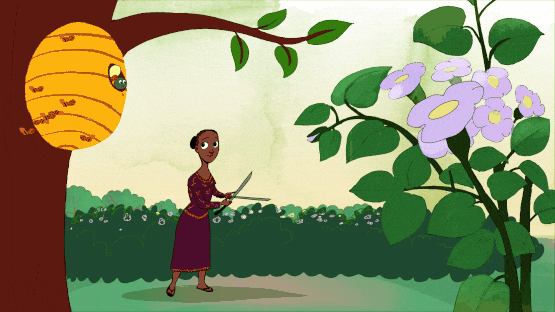
The people in my community are mostly farmers; however, many do not farm for themselves. Instead they sell their labour to commercial farms and landowners who do not want to farm. Farmers with low incomes will also do labour work for additional income with the nearby Holeta Agriculture Research Institute. The Institute supports the community and provides technical support to me and other farmers. I’ve worked closely with the research institute since 2009. In 2016 they even built me a greenhouse to support my farming practice.
The staff at the research institute come frequently, and the last time they came to see how I am doing, they suggested that I use chemicals. I insisted that I wouldn’t. I told them that they could even take the greenhouse back if I can't only do organic farming in it. Realizing how determined I was to maintain my organic farming practice, they’ve since left that issue alone.
As long as the land gives
All of my children — except my last child, who is too young to understand — are interested in farming. Even my children know that it's important to keep the land nurtured and to care for it as much as possible. After all, we live only as long as the land gives.
They are particularly interested in organic agriculture because they see and know the benefits. At one point some people came to our house asking if I needed fertilisers, and my kids responded before I could even open my mouth. They told the person that we had no use for chemical fertilisers. They know we don't need any chemical fertilisers because we know the harm they cause.
My oldest child is extremely keen on growing food, so I've given him some working space in the garden. My second-born is also quite interested, and I know that when I am away from home for any reason, my children are perfectly capable of taking care of the farm.
Hard work, determination, and focus
I want my community to work hard and overcome poverty and hunger. Some of them don't even have a problem with land. They have their own land, but they don't want to work on it because it requires hard work, determination, and focus. Most people in my community prefer to sell their land and work for other rich farmers for a wage. I advise them not to sell their land. The main challenge I hear people bring up is that you only get money after the full crop cycle is finished, which is the only point at which you can then sell your produce. Working as hired labour means they get a monthly wage and do not need to wait as long to get money as a person growing their own food.
It is true, undeniable actually, that my community has many problems. For instance, we have a shortage of water. We struggle to cultivate our land because we have limited water resources, but that should never be a reason for people to give up their land, to give up farming and start working for other people.
We need to exert a relentless effort to get out of poverty, to feed ourselves, and to feed our nation. Some people wonder when they come to my household whether I ever stop working. They usually find me amongst my vegetables in my garden, working. They say I work day and night like an iron woman, but really, I'm just as strong as what my will and the support of my husband and children enable.
People are changing
I can see some people are changing in my community. We need to do more, change more, work hard, and do our own farming. Some people in my community are turning towards organic agriculture. They're coming to me for advice and guidance.
We've been hit by frost and bad weather on several occasions recently. Sometimes crops get devastated by frost and bad weather, but the crops of organic farmers have proved to be a little more resilient. They are not as badly damaged as those of farmers who apply chemical fertilisers on their land.
More and more farmers are thinking about organic agriculture. The farmers that use chemicals have started coming to me with new insects and pests they find on their farms, to ask for advice on how to deal with these pests. Even the elders in my community are admiring me and appreciating my efforts. I have been able to write down some of the traditional pest control methods that used to be practised by earlier generations but are increasingly getting forgotten over the years.
I wish that all the people in my community, especially the women, were farmers instead of being dependent on selling their labour to others for income. I wish that people could recognize that they could put that same energy into their own land and have produce, which would be theirs, instead of working on these large farms and earning only a small amount without having anything of their own. They can work on their own land, earn a living, and live a good life just like I do.
It is possible to create change and restore the land, but it takes hard work. My own journey with land, the struggles I had with chemical farming, and my homecoming [to] organic farming, supported by ISD, shows that there is hope for creating a different future.
- Oromia is the largest of nine regional states into which Ethiopia is divided. It is estimated that there are over 30 million Oromo people in the country.
- The Derg (commonly Derg or Dergue) is the short name of the Coordinating Committee of the Armed Forces, Police and Territorial Army, which ruled Ethiopia from 1974 to 1991. The Ethiopian People's Revolutionary Democratic Front is the current ruling political coalition in Ethiopia. This front consists of four political parties.
- Agarfa, is a district in the Bale Zone of the Oromia Region approximately 418 kilometeres from Addis Ababa, the capital city of Ethiopia.
- The Institute for Sustainable Development, a registered Ethiopian civil society organization, started its work in 1996 and focuses on rural farming communities. It seeks to raise the importance of using sustainable knowledge, practices, and innovations to support and improve the livelihoods of local Ethiopian communities. It works to “incorporate the best of both traditional and modern knowledge through sharing experiences, open dialogue, research and training, based on genuine participation.” For more see: http://www.isd-bio.org/
